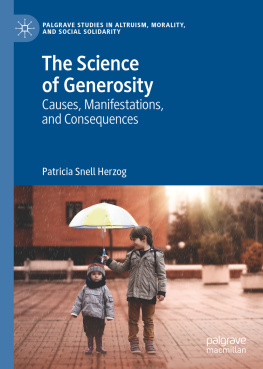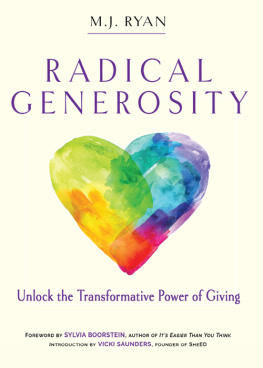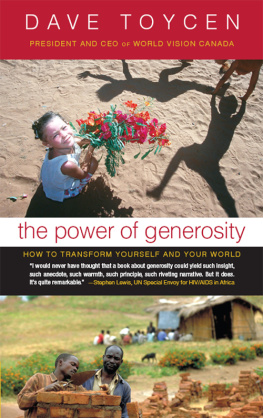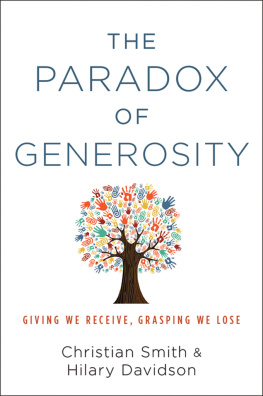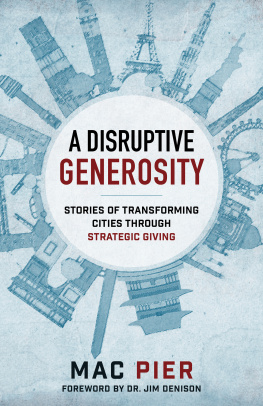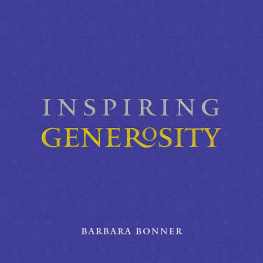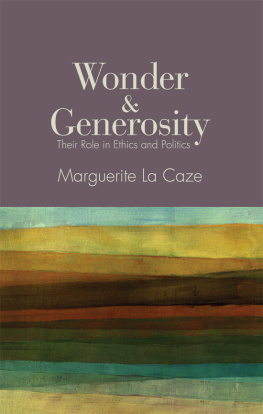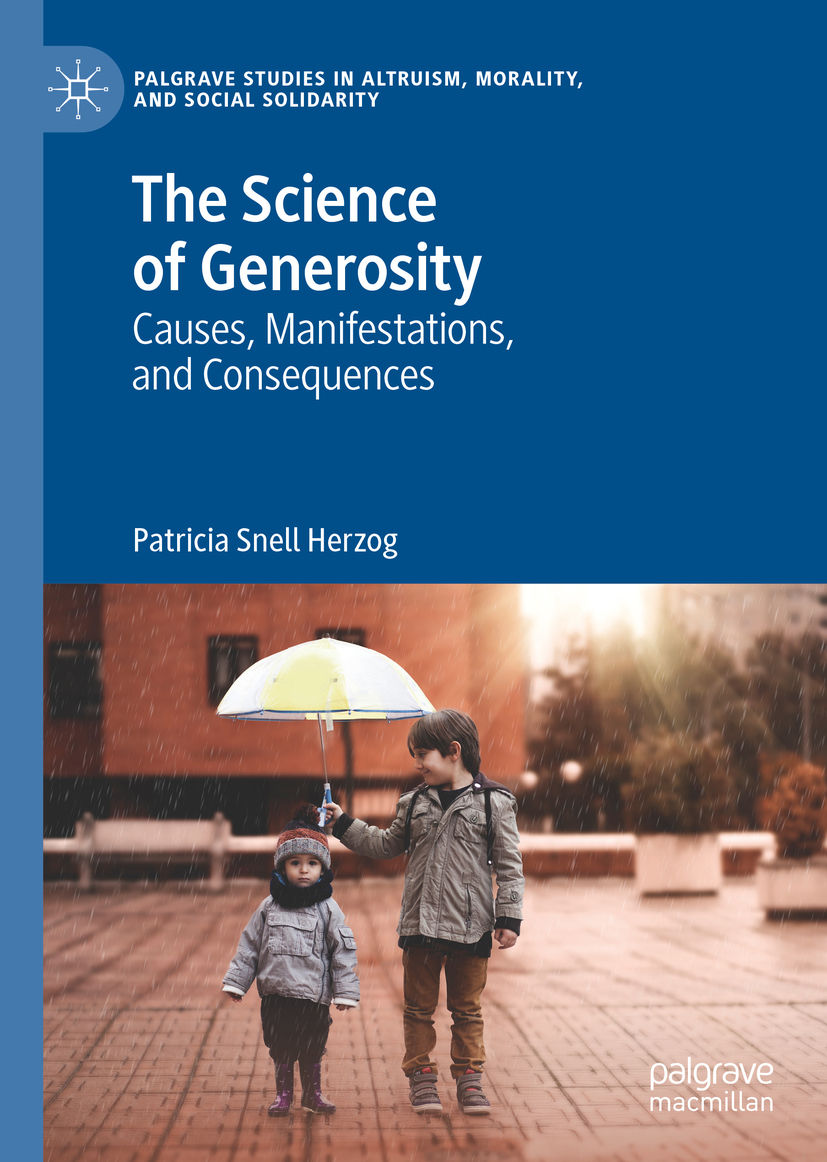Palgrave Studies in Altruism, Morality, and Social Solidarity
Series Editors
Peter Callero
Department of Sociology, Western Oregon University, Salem, OR, USA
Matthew Lee
Department of Sociology, University of Akron, Harvard, OH, USA
Jane A. Piliavin
University of WisconsinMadison, Madison, WI, USA
The series, as its name implies, focuses on altruism, morality, and social solidarity and their interrelationships. These phenomena were of major concern in the founding and early years of sociology. Renewed interest in their study has occurred in recent years, not only in sociology but also in related disciplines such as psychology, economics, and philosophy.
An awareness of the interdependence of these phenomena is also developing, and this series will expand on this while linking the phenomena to important topical issues and developing their implications for the public discourse and public good. Early, foundational scholarship in this area was grounded largely in the writings of sociologists Emile Durkheim, Jane Addams, and Pitirim A. Sorokin, whose work provides a comprehensive and powerful intellectual foundation for future theories and empirical studies. Contributions to the series will build on the mentioned foundational thinkers and will make use of a range of theoretical approaches, including symbolic interactionism, conflict theory, rational choice theory, personalism, Marxist theory, systems theory, and identity theory.
More information about this series at http://www.palgrave.com/gp/series/15784
Patricia Snell Herzog
The Science of Generosity
Causes, Manifestations, and Consequences
Patricia Snell Herzog
Indianapolis, IN, USA
Palgrave Studies in Altruism, Morality, and Social Solidarity
ISBN 978-3-030-26499-4 e-ISBN 978-3-030-26500-7
https://doi.org/10.1007/978-3-030-26500-7
The Editor(s) (if applicable) and The Author(s) 2020
This work is subject to copyright. All rights are solely and exclusively licensed by the Publisher, whether the whole or part of the material is concerned, specifically the rights of translation, reprinting, reuse of illustrations, recitation, broadcasting, reproduction on microfilms or in any other physical way, and transmission or information storage and retrieval, electronic adaptation, computer software, or by similar or dissimilar methodology now known or hereafter developed.
The use of general descriptive names, registered names, trademarks, service marks, etc. in this publication does not imply, even in the absence of a specific statement, that such names are exempt from the relevant protective laws and regulations and therefore free for general use.
The publisher, the authors and the editors are safe to assume that the advice and information in this book are believed to be true and accurate at the date of publication. Neither the publisher nor the authors or the editors give a warranty, express or implied, with respect to the material contained herein or for any errors or omissions that may have been made. The publisher remains neutral with regard to jurisdictional claims in published maps and institutional affiliations.
Cover illustration: Estersinhache fotografa / Moment / Getty Images
This Palgrave Macmillan imprint is published by the registered company Springer Nature Switzerland AG.
The registered company address is: Gewerbestrasse 11, 6330 Cham, Switzerland
Acknowledgments and Preface
I am enormously grateful for the role of Christian Smith in helping to form the research that led to this book. Chris and I had a fortuitous meeting over coffee, as he was about to hop on an early morning plane back to North Carolina, and as I had just moved back to South Bend, Indiana, to be present for my younger sisters last years of high school. Having just completed by Master of Social Work degree, I was primed and ready to be a nonprofit executive director, while waiting to eventually answer the call to return to graduate school in sociology. I knew I needed to heed that call, but I wanted to gain more real-world practitioner experience in the interim. The year was 2006, and Chris had just been hired to direct the newly reviving Center for the Study of Religion and Society in the Department of Sociology at the University of Notre Dame. Chris had arranged an unusual situation to remain primarily located in North Carolina, as he concluded his research obligations at the University of North Carolina and also migrated his family north. I need someone to run the center while I am away, Chris told me over coffee. I asked myself: Help run a nonprofit entity, within my home discipline of sociology? It was a dream come true.
Together, Chris and I found ways to blend my interest in community , nonprofits, and youth with his interests in religion and youth. Our first collaborative project was on a book calledPassing the Plate: Why American Christians Dont Give Away More, which he and Michael Emerson were co-authoring. I began my integration into the congregational world by traveling around the country conducting most of the in-depth qualitative interviews that informed that book and co-authored the fourth chapter, into which I coined some of my first sociological terms: comfortable guilt, on the part of American religious givers (explaining why they were comfortable not giving as much as they themselves thought that they should) and live the vision versus pay the bills, describing different approaches that pastors and priests took to talking about charitable giving within their congregations. Chris and Michael invited my input on other chapters too. That book established the foundation upon which we built many more projects, including a planning grant with the John Templeton Foundation in Spring 2007. In that planning grant, I had the opportunity to create a database of all the scholars around the world who were interested in studying topics related to generosity, forming the same keyword searching that later informed this book.
We also collaborated with several established and emerging scholars to write literature reviews that also contributed early learnings to this book. Most notably, I learned a great deal in that planning grant from Pamala Wiepking and Ren Bekkers (2007), who were both at the time in the Department of Philanthropic Studies at the University of Amsterdam in the Netherlands (Pamala has since joined the Indiana University Lilly Family School of Philanthropy, where I am also now a faculty member; I am thus incredibly fortunate to be in-house colleagues with Pamala these days.). Back in the planning stages for the Science of Generosity Initiative, Pamala and Ren wrote a literature review on individual motivations for giving, which has since been published as a two-part series and been cited hundreds of times. It is one of the most informative publications on the topic. I also benefited in that planning grant from the expertise of Jessica Collett , who was at the time a professor at the University of Notre Dame (she is now faculty at the University of California, Los Angeles), and who led graduate student Chris Morrissey in writing a second literature review (2007) on the social psychology of generosity. Brandon Vaidyanathan and I also began the first of many collaborations on that project, and Brandon (2008) wrote a literature review on corporate philanthropy that informed another layer of organizational generosity understanding. Fourth, Ryan Lincoln, Chris Morrissey, and Peter Mundey (2008) also wrote a literature review on religious giving. Brandon, Ryan, Chris, and Peter were all graduate students at Notre Dame.

